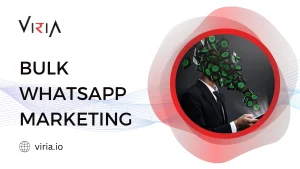SMS marketing for retail is changing the way businesses connect with customers. With its ability to send personalized, instant messages, SMS marketing has become a go-to tool for retail businesses to drive sales, promote offers, and engage customers. In this blog, we’ll explore the importance of SMS marketing in retail, how it works, and why every retailer should use it.
What is SMS Marketing for Retail?
SMS marketing for retail is the process of using text messages to communicate with customers about offers, promotions, and updates.
What is SMS in Retail?
In retail, SMS is used to send messages directly to customers’ phones, ensuring they receive and read them quickly. It’s perfect for announcing flash sales, promoting loyalty programs, and even sending reminders.
Awareness
For retail businesses, SMS marketing ensures your brand stays at the top of your customer’s mind. With a simple text, you can inform them about exclusive deals or new arrivals, keeping them engaged with your store.

How Retail SMS Works
Retail SMS marketing functions through a straightforward process that makes it accessible and efficient for retailers to implement. The process typically involves integrating SMS platforms with a retailer’s customer database or CRM system, allowing for targeted communication.
- Message Creation: Retailers craft concise, engaging messages designed to prompt immediate action from recipients. These messages may include promotions, reminders, or customer service notifications. A good message is personalized and relevant, speaking directly to the needs or desires of the customer.
- Targeting & Segmentation: One of the most powerful aspects of text message marketing for retailers is the ability to target specific customer segments. Retailers can categorize customers based on previous purchases, preferences, or behavior and send tailored messages that speak to their unique interests.
- Scheduling & Automation: SMS campaigns can be scheduled to send at optimal times, such as during peak shopping hours or around significant events like sales or product launches. Automation tools ensure that messages are sent without manual intervention, making it easy to manage multiple campaigns simultaneously.
- Response Handling: Retailers can include calls-to-action in their text messages, such as “Reply for more information” or “Click here to redeem your discount.” These responses can be automated or handled by customer service, providing a seamless experience for both the retailer and the customer.
How Retailers Use Text Marketing
Retailers leverage text message marketing to engage customers instantly and personally, making it an effective tool for various retail needs.
- Exclusive Offers & Promotions: Retailers send time-sensitive discounts, flash sales, and limited-time offers to encourage immediate action.
- Order and Delivery Updates: Texts keep customers informed about order status, shipping details, and delivery times.
- Personalized Shopping Experience: Customized messages based on past behavior, preferences, or location help enhance the shopping experience.
- Customer Service & Support: Retailers resolve inquiries and provide quick support via text, offering a convenient alternative to emails or phone calls.
Retail SMS Marketing Strategies to Boost Sales
Retailers can take several strategic approaches to maximize the impact of their text message marketing campaigns. By employing these tactics, retailers can boost sales, increase customer loyalty, and drive engagement.
- Loyalty Programs: Retailers can use text messaging to promote loyalty programs and reward customers for repeat purchases. A simple message like “Earn 10% off your next purchase when you use your loyalty points” can encourage customers to return for future transactions.
- Flash Sales & Limited-Time Offers: Urgency is a powerful motivator, and retailers can leverage SMS to send time-sensitive offers that prompt immediate action. Messages like “24-hour sale: 50% off select items” create a sense of urgency and push customers to make quick purchasing decisions.
- Cross-Selling & Upselling: Text messages can be used to recommend complementary products or offer upgrades. For example, “You bought a pair of running shoes—how about a matching water bottle for your next workout?” This type of personalized suggestion can help increase average order value.
- Cart Abandonment Reminders: Retailers can send friendly reminders to customers who left items in their shopping cart without completing the purchase. These messages can include incentives such as discounts or free shipping to encourage customers to finalize their purchase.
- Customer Feedback & Surveys: Asking customers for feedback through text message surveys is a simple way to gain insights into customer satisfaction and preferences. Positive reviews can be shared on social media, while areas for improvement can be addressed to enhance customer experience.
- Event Invitations: Retailers can use text messages to invite customers to special events, such as product launches or exclusive in-store sales. This builds excitement and helps drive foot traffic to physical locations or online stores.
By incorporating these strategies into their text message marketing for retailers, businesses can enhance customer interaction, build stronger relationships, and ultimately boost sales and revenue.
Why Retail Text Message Marketing Is So Effective
Retailers benefit from text message marketing because of its unparalleled reach and immediacy. Unlike email, which can often be overlooked or lost in a crowded inbox, text messages have significantly higher open rates and faster response times.
- Instant Reach: Text messages are read almost immediately after being received, ensuring that the communication reaches customers quickly, which is particularly important for time-sensitive promotions or updates.
- Higher Engagement: Studies have shown that text messages have higher engagement rates compared to email and other forms of marketing. This high level of responsiveness is a key reason retailers continue to invest in text message marketing for retailers.
- Minimal Effort, Maximum Impact: Sending a message via text is simple and doesn’t require intricate designs or lengthy copy. Retailers can convey their message clearly and concisely, capturing the attention of their customers without overwhelming them.
- No Need for Internet Access: Unlike email or app-based notifications, text messages don’t require an internet connection. This ensures that the message reaches customers, even in areas with poor network coverage or in regions where internet access is limited.
Benefits of Text Marketing for Retail
Text marketing for retail offers numerous benefits that make it a preferred choice for retailers.
Why Retailers Use SMS Marketing:
- Instant Communication: Texts are delivered and read within minutes.
- Wide Reach: Almost everyone has a mobile phone, making SMS a universal tool.
- Cost-Effective: SMS marketing is budget-friendly, perfect for small and large retailers.
- High Engagement Rates: Customers are more likely to open and read texts than emails.
Interest
Imagine sending a quick “50% off sale today only!” message to your customers and seeing your store fill up with eager shoppers. Text marketing for retail can help you achieve this and much more.
How to Use SMS Marketing for Retail Effectively
To make the most of SMS marketing for retail, it’s important to use the right strategies.
Ways Retailers Can Use SMS Marketing:
- Promote Sales and Discounts: Share exclusive offers or flash sales.
- Send Reminders: Notify customers about restocks or abandoned carts.
- Loyalty Programs: Reward loyal customers with special discounts via SMS.
- Feedback Collection: Use SMS to ask customers for reviews and improve services.
What is SMS in Retail Communication?
Retail communication through SMS is direct and effective. Whether it’s a “Thank you for shopping with us!” message or a notification about an order, SMS helps you maintain a strong connection with customers.
Desire
When customers feel valued through personalized messages, they’re more likely to return. SMS marketing creates that emotional connection, turning one-time shoppers into loyal customers.
Best Practices for Text Marketing for Retail
To get the best results, follow these SMS marketing tips:
- Keep Messages Short: Stick to 160 characters to ensure your message is concise and clear.
- Add a Call-to-Action: Encourage customers to act, like “Shop now!” or “Claim your offer!”
- Time Your Messages: Avoid sending texts during odd hours; choose times when customers are most active.
- Personalize Your Texts: Use customer names or preferences to make messages feel personal.
Action
Ready to transform your retail marketing? Start by setting up a campaign that targets your customers with personalized messages. SMS marketing for retail is easy to implement and delivers results fast!
Conclusion
SMS marketing for retail is a must-have tool for businesses looking to stay connected with their customers and boost sales. From text marketing for retail to understanding what is SMS in retail, this guide has covered why SMS is essential for retail success. Start using SMS marketing today and see how it can take your retail business to the next level!
Read also SMS for Healthcare




